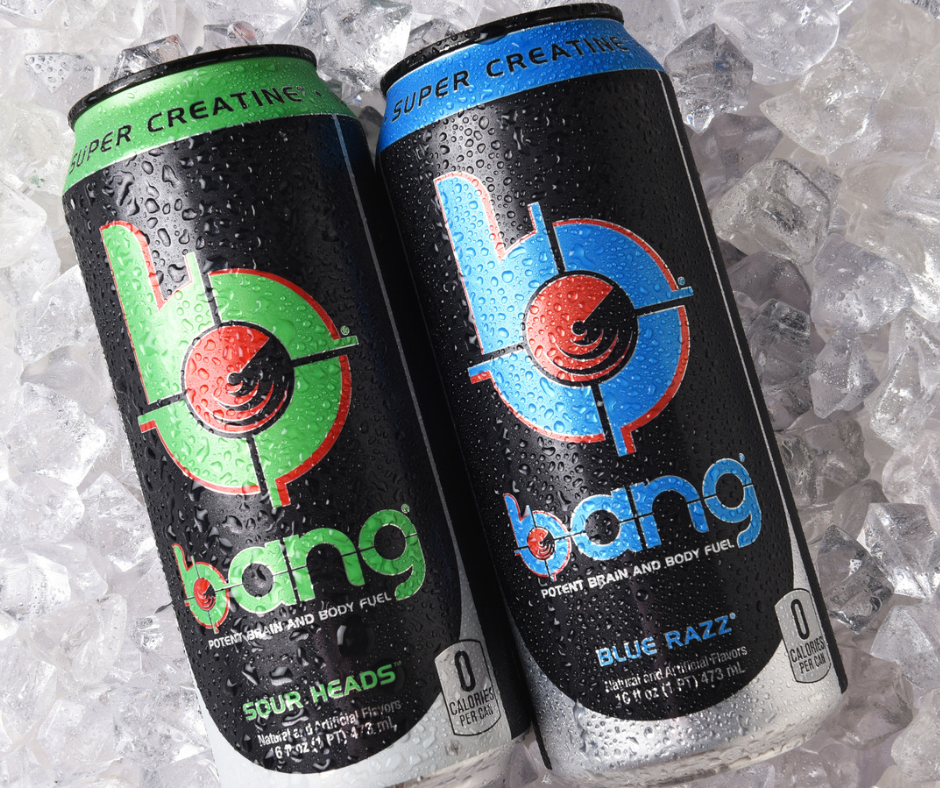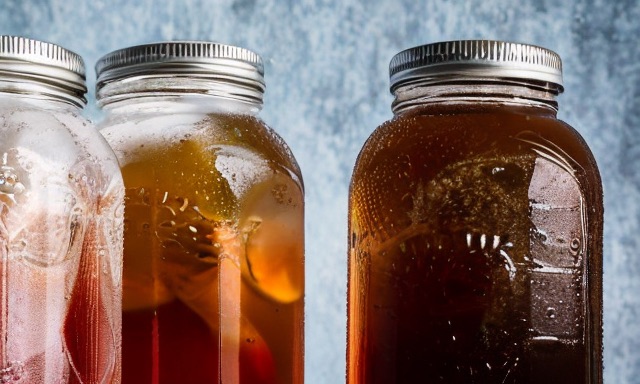Yes, Kombucha does contain caffeine, since it’s typically made from tea leaves. The exact amount varies depending on the tea used and the brewing process.
Kombucha has become a popular fermented drink, praised for its probiotic benefits and unique taste. Originating from Northeast China around 220 B. C. And treasured for its alleged healing properties, kombucha is created through the fermentation of tea (commonly black or green) by a symbiotic culture of bacteria and yeast (SCOBY).
This fermentation process not only produces a distinctive tangy flavor but also a trace amount of caffeine. The caffeine content is often lower than that of the original tea used, as some is broken down during fermentation, making kombucha a milder alternative for those looking to reduce their caffeine intake while still enjoying a refreshing, effervescent beverage.
Kombucha Basics: Brewed For Health
Kombucha is a fizzy, tangy drink many love for its taste and health perks. People say it aids digestion and boosts immunity. But does this trendy tea have caffeine? Let’s brew up some knowledge.
Origins And Popularity
The history of kombucha starts in East Asia. For centuries, it’s been known as the ‘Immortal Health Elixir’. With time, its fame spread across the globe. Today, kombucha finds a place in countless fridges worldwide.
In recent years, this fermented tea has gained a health-savvy following. Celebrities sip it, and wellness blogs praise it. Its following grows daily, making it a staple in health food stores.
Essential Ingredients And Fermentation Process
Kombucha’s recipe is simple but fascinating. It blends tea, sugar, and SCOBY — a combo of bacteria and yeast. This SCOBY is the fermentation powerhouse. It turns sweet tea into a healthful brew.
| Ingredient | Purpose | Notes |
|---|---|---|
| Tea | Base | Green or black, often organic |
| Sugar | Food for SCOBY | Usually cane sugar |
| SCOBY | Fermentation | Symbiotic culture of bacteria and yeast |
Fermentation takes 7-30 days. The SCOBY eats the sugar, creating tasty, healthful acids. The process gives kombucha its signature fizz.
This ancient beverage is loved not only for its unique flavor but also for the gut-friendly probiotics it contains, believed to aid in a plethora of body functions and promote a healthy balance within the body’s systems.

Caffeine Content In Kombucha: The Hidden Stimulant
Kombucha, a fizzy and tangy health drink, has taken wellness circles by storm. But many are surprised to learn that this fermented tea harbors caffeine. Not just a probiotic, kombucha can also offer a gentle buzz, reminiscent of your morning cup of joe. Knowing the caffeine content is crucial, particularly for those monitoring their intake.
Sources Of Caffeine In Kombucha
Kombucha’s initial ingredient is tea, typically black or green, both of which naturally contain caffeine. Through fermentation, this caffeine becomes part of the final beverage. Yet, not all kombucha drinks have equal caffeine levels.
- Black Tea: Offers higher caffeine content
- Green Tea: Contains a moderate amount
- White Tea: Results in lower caffeine levels in kombucha
Factors Influencing Caffeine Levels
Different factors can change how much caffeine ends up in your kombucha drink. Understanding these helps in choosing the right kombucha for you.
| Factor | Effect on Caffeine |
|---|---|
| Tea Type | Some teas have more caffeine |
| Brew Time | Longer brews increase caffeine |
| Fermentation Duration | Longer can mean less caffeine |
| Amount of Tea Used | More tea equals more caffeine |
Always check the label or ask the maker about caffeine levels in kombucha. If you’re sensitive to caffeine, opt for kombucha made with herbs or decaffeinated tea. Your gut and your energy levels will thank you!
Comparing Caffeine: Kombucha Versus Other Beverages
Ever wondered how the caffeine in your beloved kombucha compares to other popular beverages? Many of us reach for a drink for an energy boost without considering its caffeine content. So, let’s dive into a caffeine comparison to better understand how kombucha stands alongside other common drinks.
Kombucha Vs. Coffee: A Caffeine Clash
When it comes to caffeine, coffee holds the crown. A typical cup of coffee can contain about 95 mg of caffeine, dwarfing what you’d find in kombucha. However, kombucha, with around 10-25 mg per serving, offers a gentler lift. For those seeking a milder caffeine kick, kombucha could be the go-to choice.
| Drink | Caffeine Content |
|---|---|
| Kombucha | 10-25 mg per serving |
| Coffee | 95 mg per serving |
Tea And Soft Drinks: Measuring Up
Tea, the source of kombucha’s caffeine, varies widely in content. Black tea might have 40-70 mg, while green tea often boasts a modest 20-45 mg. Soft drinks, on the other hand, typically fall between these two, with around 20-40 mg per can. Choosing between these drinks depends on your caffeine sensitivity and preference.
- Black Tea: 40-70 mg per serving
- Green Tea: 20-45 mg per serving
- Soft Drinks: 20-40 mg per can
Health Implications: Caffeine’s Double-edged Sword
Kombucha, the fermented tea loved by many, often brings up questions about its caffeine content. We explore the health implications of caffeine in kombucha, a double-edged sword with both benefits and potential risks.
Benefits Of Caffeine Consumption
Caffeine, a natural stimulant found in tea leaves, is present in kombucha. It perks up your brain, improving focus and alertness. Small doses can boost your mood. Athletes may find that caffeine improves their performance. Here’s a list of caffeine’s positive effects:
- Enhanced Mental Alertness: Keeps your mind sharp.
- Increased Physical Performance: Gives a tiny boost to athletes.
- Mood Elevation: Offers a sense of well-being.
Potential Risks And Side Effects
While caffeine has its virtues, too much can be problematic. Side effects include jitters, disrupted sleep, and heart palpitations. Kombucha drinkers should monitor their intake. Here are the key risks associated with too much caffeine:
- Sleep Disruption: Can lead to insomnia.
- Anxiety: May cause nervousness or jitters.
- Heart Issues: Excess may trigger palpitations.
For those sensitive to caffeine, opt for kombucha made from decaffeinated tea or consume it in moderation.
Making An Informed Choice: Kombucha For Caffeine Sensitivity

Making the right choice with kombucha can be tricky for those with caffeine sensitivity. Understanding kombucha’s caffeine content helps everyone enjoy its benefits without the unwanted buzz.
Identifying Low-caffeine Kombucha Options
Checking the label is key to finding a kombucha with less caffeine. Many brands include caffeine information, allowing for an informed choice.
- Seek ‘low-caffeine’ labels for easy identification
- Dive into ingredients to spot decaffeinated tea bases
- Remember, lighter teas like green or white may have less caffeine
Lifestyle Considerations For Caffeine Intake
Personal lifestyle factors dictate caffeine sensitivity and daily allowances. This makes it crucial to tailor kombucha consumption accordingly.
| Factor | Impact on Caffeine Sensitivity |
|---|---|
| Sleep patterns | More sensitive if sleep is erratic |
| Daily stress | High stress can enhance sensitivity |
| Physical activity | Active lifestyles may process caffeine faster |
Align your kombucha choice with your routine to maintain balance and comfort.

Frequently Asked Questions On Does Kombucha Have Caffeine
Does Kombucha Naturally Contain Caffeine?
Yes, kombucha naturally contains caffeine as it is brewed from tea leaves, which have caffeine. The caffeine content may reduce during fermentation but is not entirely eliminated. The resulting caffeine level varies depending on the tea used and the duration of fermentation.
How Much Caffeine Is In A Serving Of Kombucha?
A typical serving of kombucha has about 10-25 milligrams of caffeine. This varies with the type of tea and brewing time. It’s generally lower than a cup of coffee or tea.
Can You Get Decaffeinated Kombucha?
Decaffeinated kombucha is available, but less common. Some brands offer it by brewing with decaffeinated tea. However, the decaffeination process might affect the kombucha’s flavor and health benefits.
Is Kombucha Suitable For A Caffeine-free Diet?
For those strictly avoiding caffeine, kombucha might not be suitable due to its inherent caffeine content. Alternatives include caffeine-free herbal kombuchas or other probiotic beverages.
Conclusion
Concluding our exploration into kombucha’s caffeine content, remember that this fizzy brew usually contains caffeine, but the amount varies. Checking labels or contacting manufacturers can clarify specifics. Enjoy kombucha’s benefits while being mindful of your caffeine intake. For those sensitive to caffeine, seeking low-caffeine or caffeine-free options might be wise.
Here’s to your health and finding the perfect kombucha balance!

